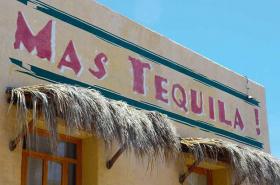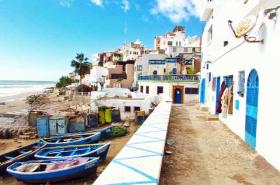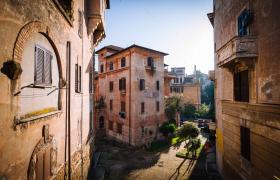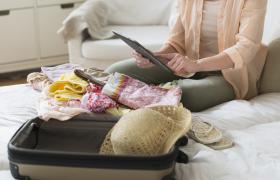Using the holiday budget calculator is super easy.
Page 1
Fill in your:
1. Destination (Spain)
2. Expected travel style
3. Duration of stay
4. Currency (NZD/EUR)
Page 2
This section is for the daily essentials. A coffee each morning may seem irrelevant, but look how they add up over 2 weeks! It is important to be truthful here, the robots won't judge you for consuming a jug of sangria every day, but it will definitely affect your budget!
Page 3
This page is where you have to determine a shopping budget. Just remember, luggage space and finances are limited so make reasonable assumptions and don’t forget to include the souvenirs your family will be expecting!
Page 4
As we mentioned, Spain offers a variety of transport options which gives you some power over the budget. Most cities offer reliable public transport, so ensure you budget generously for this as walking will be tiring and restrict how much sightseeing you can achieve. We recommend sparing some money for a few taxi journeys too, as you never know when a situation could arise that you need to get somewhere ASAP and public systems won't cut it.
Once you have filled all these sections as accurately as you can, the robots will whizz and bang (behind the scenes - your computer will be fine) to calculate a total budget figure. It is important to remember that even though the robots are technically super-geniuses, they can only go off the information you gave them about your general travel expenses, and you will still need to consider any additional expenses unique to your travel situation.
Example Spanish Holiday Budget
If you were honest to the budget calculator (first you have to be honest to yourself - will you really stick to your diet in the country that is responsible for churros?) then you know what you need to include to budget reasonably. Let’s see what the final product could look like for an individual traveller.
The Solo Traveller’s Trip
As a solo traveller on a budget, Spain provides plenty of opportunities to save some dinero if you are flexible with your schedule. Flying at odd hours and dates can drastically reduce the cost of flights, especially if you can avoid the usual holiday periods. Due to the sheer number of backpackers in Europe, you can find clean and safe hostels in almost all Spanish cities which provide the bare minimum for accomodation but will cut costs immensely. Join into some free walking tours to gain some cultural understanding for the price of a small tip, or fraternise with other travellers in the hostels for ideas and inspiration for cheap activities and temporary travel companions.
| Transport |
Return flights from NZ$1400 per person* |
Flying from Auckland to Madrid (average flight price October 2019) |
| Accomodation |
From NZ$1200 per person
From NZ$700 per person
From NZ$300 per person
|
14 nights in mid-range hotels, major cities (Madrid, Barcelona)
14 nights in mid-range hotels, medium-big cities (Alicante, Malaga)
14 nights in a budget hostel in a shared dormitory
|
| Food |
Around NZ$750 per person |
Mixture of eating out at restaurants, takeaway and some small snacks. |
| Activities |
Barcelona Gaudi tour (NZ$130)
Flamenco Show (NZ$60)
Tickets and entrance fees
($15 avg x 10 sites = NZ$150)
|
Tickets for La Sagrada Familia, Park Guell and Casa Mila-La Pedrera + metro ticket to reach each site
Tickets to performance at the Palace of Andalucia
Palacio Real de Madrid
(Royal Palace) $20
Catedral de Sevilla (Cathedral of Seville) $15
|
This is a rough guide for a per person cost. Your situation will have the potential to change this budget estimate significantly. Remember some factors are not included in this estimate - you will still have to add the cost of travel insurance (again - this varies on an individual basis) and the cost of transport once you arrive to Spain. As mentioned before, Spain is full of surprises and you will likely find activities you didn’t plan for that you won’t want to miss, so make sure you budget in a decent sum for additional spending.
Need more help estimating costs?
If you have no idea what type of accommodation, transport, food and activities you want to do, we have broken down each for some context, which you can use as inspiration before getting on ol’ faithful Google to search prices for your specific dates and activities.
Transport
As we mentioned earlier, Spain manages to pack a plethora of diverse regions all into a very small geographic area. Due to this small size, there are lots of options for transportation across the country. Below are the standard methods of transport.
Plane: Budget airlines fly between most major cities at reasonable prices, however expect to pay hefty fees if you are carrying any checked luggage!
Train: Renfe train is the national carrier connecting most of the country. Between major cities they operate the AVE trains which travel well over 300km/h and can get you across the country almost as fast as flying (if you include airport check-in and waiting), with an excessive baggage allowance! These are generally quite cheap and easy to use, and are our recommendation especially when going between bigger cities.
Bus: There are numerous coach services in spain, connecting most of the country in an efficient network. Comparing online will get you the best prices for specific journeys, but usually ALSA has the best routes and prices.
Public transport is generally simple and there are decent bus networks around most cities and towns. Some of the less tourist-y towns might not have english assistance, but usually the process is simple enough, and in the worst-case scenario a friendly local will usually step in and assist if you cannot figure it out.
Metro: Barcelona and Madrid both have well established metro networks which are super-easy to navigate and can get you within walking distance of anywhere in the city. Single-use tickets can add up quickly and become pricey, so if you plan to stay in the city for a while it is worth picking up a multi-use ticket to save a few euros.
Car: Many car rental agencies in Spain will allow you to pick-up and drop-off a vehicle in different locations, making rental a perfect option if you love road-trip vibes and want to take the journey at your own pace, stopping and enjoying all the scattered villages along the way where you will be the only tourist.
Rideshare: Services like blah blah car offer ridesharing for larger trips, with drivers posting planned routes between destinations and how many available seats are in their vehicle. This can be a very cost effective way of getting across the country whilst also giving you an opportunity to spend time with a local and practise some español.
Accommodation
Accomodation in many Spanish regions varies significantly in price at different times of year. If you want to visit Pamplona during San Fermin (running of the bulls), expect to pay at least 100 NZD per night for a mediocre hotel on the outskirts of the city. In Barcelona, you will have to almost double your planned accommodation budget if you visit during summer. The best way to protect against this is to compare offers online and book well in advance to beat the rush. If you are travelling solo, hostels are a great way of saving money and meeting other travellers, and you can rest easy knowing Spain is one of Europe's safest countries.
Food
Food is another aspect of the budget that depends heavily on where exactly you visit. However, a common lunch offering around the country is the Menu Del Dia (Menu of the Day), which consists of an entree (soup or similar), a main dish, a dessert and a beverage (usually house wine, beer or soda). If you avoid the busy tourist districts in most cities, you can pick up these meals for between 8 - 15 euros. The Spanish generally take their time at lunch and it is by far the biggest daily meal. If you get a menu del dia for lunch, the meal is usually large enough to keep you satisfied all day and stop you wasting money on snacks throughout the day. If you do get hungry enough for a full meal in the evening - don’t rock up early like you would at home. Spaniards will be confused if you try to eat before 8pm, and restaurants will be open well past midnight with most serving dinner between 9 -11pm. Tipping is not customary in most of Spain, however tourist hotspots have adapted to foreign clientele and lots of waitstaff in these establishments will expect a tip, so avoid eating in these areas if the budget is tight.
Activities
Perhaps the most difficult part of budgeting a trip to Spain is deciding which activities you will do. There are so many available that you will have to make compromises and decide what is affordable and accessible within the timeframe of your holiday. For the most accurate budget, plan and book ahead for things like entrance fees to museums and attractions (anywhere from $10 - $30NZD) and big activities like skiing or watching a game of La Liga (even if you don’t like football, it is worth going just to see how crazy Spanish football fans really are). It is important to also reserve some extra cash in the budget for unplanned activities, in case you walk past an eye-catching flyer for a flamenco show or you can’t resist a massive paella at a fancy sea-side restaurant.
Other pre-departure Budget Expenses
All the possibilities and limited time can make preparations overwhelming, so it can be easy to forget the small stuff that is crucial to having a safe and happy holiday. Visa’s are not necessary for New Zealanders visiting less than three months, which is a chunk of paperwork we are sure you are happy to avoid! The most important thing to remember with all trips is travel insurance - Spain has a fantastic healthcare system, but travellers are not covered by the state-funded system and will be billed for any care given which can very quickly turn a small accidente into a very large expense. Dedicate the necessary portion of your budget to getting reputable travel insurance and you won’t have to live despacito* (except during siestas).
*Slowly
Some final tips before departure
While the word ‘budget’ may be the last thing you want to hear when on the holiday of a lifetime, it is unfortunately inescapable (unless you are happy to live off rice when you get home?). It is easy to spend willy-nilly while in such a surreal destination, but you risk getting in some serious financial strife, so it is worth doing just a small amount of prep which can save you bigtime on the trip and help you make the most of the experience!
- Travel outside of peak tourist seasons if possible - accommodation and transport prices will be significantly lower
- Visit a Travel Money NZ store for some expert currency advice and take advantage of the in-store cash commitment
- Have some cash prepared to avoid exorbitant airport exchange rate fees
- Remember little expenses can add up quickly - don’t tip beyond your means
- Book in advance where possible
- Load up a TravelMoney Currency Pass to lock in the exchange rate backed by our Best Price Guarantee
- Find hotels and hostels with included continental breakfasts - these are buffets and you can stuff yourself to stay full until lunch without stopping for expensive snacks
Flight costs based on search from www.flightcentre.co.nz and are indicative costs only, based on prices available on 20th October, 2019. ^Accommodation costs are based on an average per night price for budget, moderate or luxury hotels, as indicated in the table. ~Food based on the average cost of 1 coffee, 1 fast food meal and 1restaurant meal per person, per day.
COST COMPARISON TABLE: All costs are based on estimated approximate costs from major metropolitan cities. “From” costs indicate costs that start from the indicated price and may be higher than shown. Average prices indicate a typical estimated cost you would pay for the indicated item. Prices may vary from time to time, and in different cities and towns within Spain.
This blog is provided for information only and does not take into consideration your objectives, financial situation or needs. You should consider whether the information and suggestions contained in any blog entry are appropriate for you, having regard to your own objectives, financial situation and needs. While we take reasonable care in providing the blog, we give no warranties or representations that it is complete or accurate, or is appropriate for you. We are not liable for any loss caused, whether due to negligence or otherwise, arising from use of, or reliance on, the information and/or suggestions contained in this blog.












